Sierra Nevada College’s English Program has released the winners of the 5th annual High School Writing Contest, a national competition which honors high school juniors and seniors in three categories: creative nonfiction, fiction and poetry. The winners in each category receive a cash prize of $500 for first place, $250 for second and $100 for third, and the $100 Local’s Prize honors student writers from Nevada and California. The winners also receive a $20,000 scholarship offer from SNC and consideration for publication in the Sierra Nevada Review, a literary annual which publishes poetry, fiction, and nonfiction by emerging and nationally recognized authors.
The Winners
Creative Nonfiction
First Place: Lindsay Emi (Westlake Village, CA), “Latin Class in Seven (VII) Parts”
Second Place: Darla Macel Anne Canales (Erie, CO), “Oven”
Third Place: Gabriel Braunstein (Arlington MA), “Family on the Commuter Rail”
Local’s Prize: Isabella Stenvall (San Luis Obispo CA), “Wars with Numbers”
Finalists: Emily Zhang, Oriana Tang, Aletheia Wang, Jack Priessman, Annie Harmon
Fiction
First Place: Emily Zhang (Boyds MA), “Midwestern Myth”
Second Place: Lucy Silbaugh (Wyncote PA), “Burrowing”
Third Place: Laura Ingram (Disputanta VA), “Absolute Value”
Local’s Prize: Erin Stoodley (Ventura CA), “Ghosts”
Finalists: Lindsay Emi, Jessica Li, Tatiana Saleh, Madison Hoffman, Oriana Tang
Poetry
First Place: Oriana Tang (Livingston NJ), “Bildungsroman”
Second Place: Catherine Valdez (Miami FL), “Mami”
Third Place: Ruohan Miao (Chandler AZ), “Dust Bowl”
Local’s Prize: Ava Goga (Reno NV), “Notes on Repression”
Finalists: Emily Zhang, Katia Kozachok, Allie Spensley, Emma Symmonds, Jessica Prescott
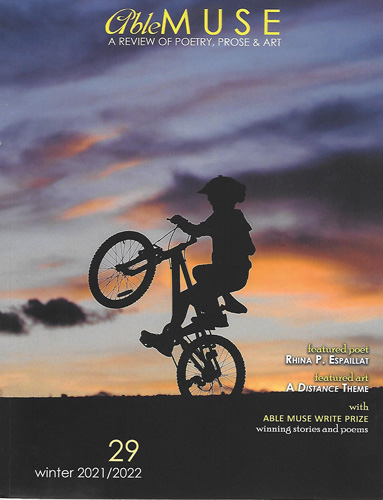 Able Muse Winter 2014 features poetry from Scott M. Miller, winner of the 2014 Write Prize for Poetry, as well as by finalists Eric Berlin, Marilyn L. Taylor, and Catherine Chandler. Winning work of the 2014 Write Prize for Fiction, J. Preston Witt, is featured as well.
Able Muse Winter 2014 features poetry from Scott M. Miller, winner of the 2014 Write Prize for Poetry, as well as by finalists Eric Berlin, Marilyn L. Taylor, and Catherine Chandler. Winning work of the 2014 Write Prize for Fiction, J. Preston Witt, is featured as well.
 The
The 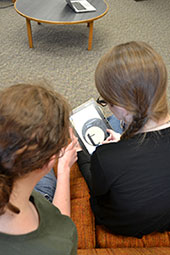
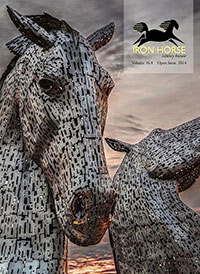
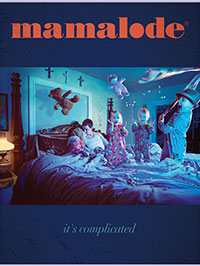
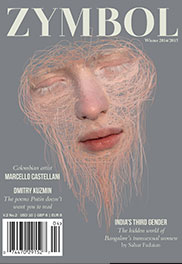
 First place: Eva Lomski [pictured], of Melbourne, Australia, wins $1500 for “The Things We Build.” Her story will be published in Issue 96 of Glimmer Train Stories.
First place: Eva Lomski [pictured], of Melbourne, Australia, wins $1500 for “The Things We Build.” Her story will be published in Issue 96 of Glimmer Train Stories.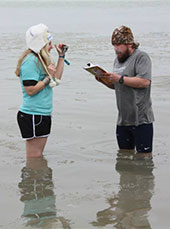 $50 knees
$50 knees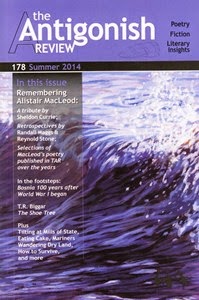 The newest issue of
The newest issue of 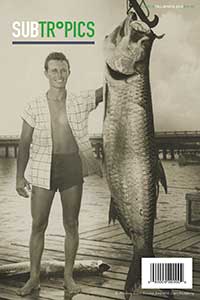 I’ve noticed lately that print literary journals take a variety of approaches to how they use the back cover of their publication. Their backsides might be completely blank, carry over the cover art from the front, feature a separate artwork, be a money-making ad spot for anything from creative writing programs to publishing to chocolates, list contributors – and perhaps even include a tag line for the works inside.
I’ve noticed lately that print literary journals take a variety of approaches to how they use the back cover of their publication. Their backsides might be completely blank, carry over the cover art from the front, feature a separate artwork, be a money-making ad spot for anything from creative writing programs to publishing to chocolates, list contributors – and perhaps even include a tag line for the works inside.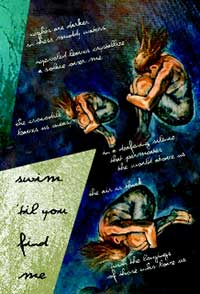 Subscription that is! Still looking for a great gift for someone on your list? One of my favorites is
Subscription that is! Still looking for a great gift for someone on your list? One of my favorites is  The Winter 2014 issue of
The Winter 2014 issue of 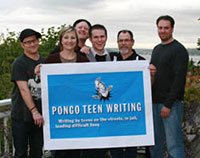 According to founder, writer, and teacher Richard Gold, “The Pongo methodology serves multiple audiences: (1) Therapists and teachers who work with at-risk youth, in private practice or through agencies or in special schools; (2) College students, therapists, artists, and teachers who are interested in starting writing programs in jails, shelters, hospitals, and special schools; (3) College students and faculty in schools of social work, medicine, creative writing, psychology, and education; (4) Staff in institutions, such as jails and hospitals, who are interested in expanding their programming. Multiple agencies, colleges, and institutions can come together to sponsor a Pongo visit and training.”
According to founder, writer, and teacher Richard Gold, “The Pongo methodology serves multiple audiences: (1) Therapists and teachers who work with at-risk youth, in private practice or through agencies or in special schools; (2) College students, therapists, artists, and teachers who are interested in starting writing programs in jails, shelters, hospitals, and special schools; (3) College students and faculty in schools of social work, medicine, creative writing, psychology, and education; (4) Staff in institutions, such as jails and hospitals, who are interested in expanding their programming. Multiple agencies, colleges, and institutions can come together to sponsor a Pongo visit and training.” Disability and Poetry is the topic of discussion in the
Disability and Poetry is the topic of discussion in the 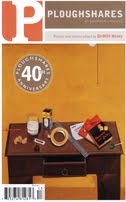 The newest issue of
The newest issue of 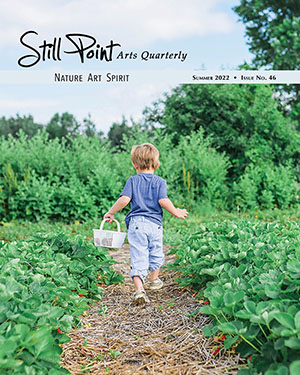
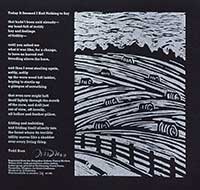 Here’s a great holiday gift for any poetry lover on your list:
Here’s a great holiday gift for any poetry lover on your list: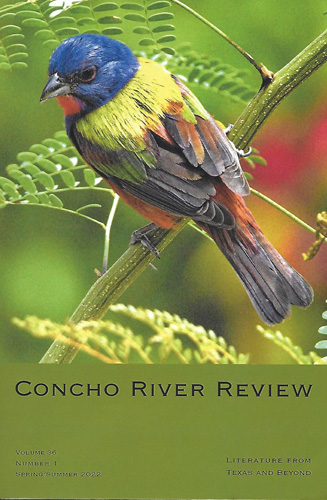 As noted in the Fall 2014 Forward of
As noted in the Fall 2014 Forward of 
 I selected this cover image on
I selected this cover image on 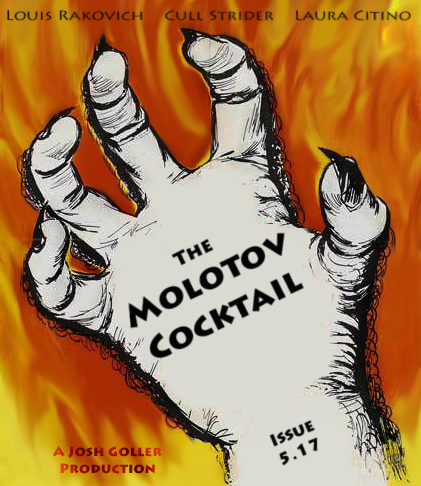 It was both the image and the opening editorial lines that drew me to this issue of
It was both the image and the opening editorial lines that drew me to this issue of  Melissa R. Sipin, winner of the 2013 Glimmer Train Fiction Open, offers a craft essay in the
Melissa R. Sipin, winner of the 2013 Glimmer Train Fiction Open, offers a craft essay in the 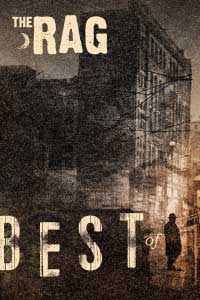 If you’re looking to read from an independent, writing a bit on the gritty and grimy side, cutting-edge, and fresh – all words Editors Seth Porter and Dan Reilly use to describe
If you’re looking to read from an independent, writing a bit on the gritty and grimy side, cutting-edge, and fresh – all words Editors Seth Porter and Dan Reilly use to describe 

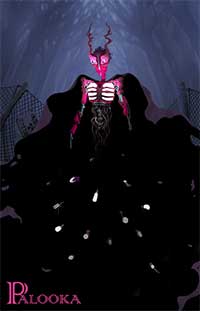
 First place: Rowena Macdonald, of London, UK, wins $1500 for “My Brother Is Back.” Her story will be published in Issue 96 of Glimmer Train Stories. [Photo credit: Martin Fuller.]
First place: Rowena Macdonald, of London, UK, wins $1500 for “My Brother Is Back.” Her story will be published in Issue 96 of Glimmer Train Stories. [Photo credit: Martin Fuller.] Founded by Alexandra Berlina, Department of American Studies, University of Duisburg-Essen,
Founded by Alexandra Berlina, Department of American Studies, University of Duisburg-Essen, 
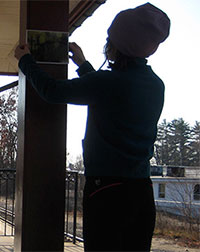 We hope you are feeling deeply connected to the things in your lives for which you are grateful. Among our many gratitudes is that Broadsided is a responsive entity, developing its interactions with the world as situations arise. The events in Ferguson, Missouri have, as we all know, radiated outward to touch upon deep issues in American culture. Race, power, violence, justice, and questions of how we can create and maintain a society that is just and safe for all its citizens.
We hope you are feeling deeply connected to the things in your lives for which you are grateful. Among our many gratitudes is that Broadsided is a responsive entity, developing its interactions with the world as situations arise. The events in Ferguson, Missouri have, as we all know, radiated outward to touch upon deep issues in American culture. Race, power, violence, justice, and questions of how we can create and maintain a society that is just and safe for all its citizens.